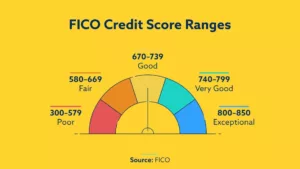Student loan debt hit a new milestone in the third quarter of 2022. Borrowers owe $1.768 trillion in outstanding student loan debt according to the Federal Reserve.
The Biden Administration's student loan forgiveness program has been put on hold due to legal challenges. But the Department of Education was able to approve more than 16 million applications despite the hold on the program.
If the Biden administration's appeal prevails in court, approved borrowers could get up to $20,000 in student debt cancelled. Until the matter is heard by the Supreme Court, Education Secretary Miguel Cardona is extending the payment pause to no later than June 30, 2023.
Education Secretary Miguel Cardona is extending the payment pause to no later than June 30, 2023, giving the Supreme Court time to hear the case in its current term.
Millions of Americans could get relief from student loan debt but how does student loan debt impact credit scores?
1. Student loans on credit reports
When students are in their 20s, student loans play an important role in establishing much of their credit scores. That’s because the Credit CARD Act of 2009, changed credit card approval rules for college students and recent grads – making them stricter. To qualify for a credit card, students need to prove they have a steady-enough income to handle make payments. Many fresh-out-of-college job seekers don’t meet that criteria making student loans often the only source of establishing a credit history.
2. Student loans are “installment” loans
Two different loan types are used to calculate FICO scores – installment and revolving.
- Installment loans are a fixed loan amount that you pay back on a regular payment schedule over a predetermined amount of time. Auto loans, mortgages, and student loans fall into the installment credit category.
- Revolving loans work a little differently. Instead of a fixed loan amount, revolving loans give borrowers a credit limit—how much of that limit borrowers use is up to them, and the payments change depending on how much the borrower charges every month. Credit cards are prime examples of revolving loans.
This means you can have a large amount of student loan debt without totally ruining your credit scores, unlike high revolving debt which is a credit score killer.
3. On-time student loan payments most important
Payment history already makes up the largest portion of your score factors – 35%. But the effect is even more prominent when your credit history is short or only includes student loans. Monthly payments must be on time, every time, or you risk doing damage to your credit scores. When a student loan is the only information on your credit report, your scores will severely feel the impact of missing even one payment.
4. Student loans add to your credit “mix”
Having different types of credit on your reports known as the “credit mix” is important. A healthy mix of credit determines 10% of your scores. If students have credit cards (revolving credit) along with student loans in their credit files it helps your credit score.
But the less information on your credit report, the bigger factor it plays. A young grad with a thin credit history can benefit from having an “installment” student loan on her credit report, because responsibly managing it demonstrates that she has experience dealing with different types of credit.
5. Student loans can help you qualify for credit cards
Young graduates who have not established a solid credit history can be helped by a strong payment history of on-time student-loan payments. Timely payments can help build your credit and improve your chances of qualifying for a credit card when you do apply.
6. How late student loan payments affect credit scores
Making late payments—or missing them altogether—can lower your credit scores, causing a ripple effect where you will not be able to qualify for other types of credit. Payment history is the most important factor in credit scores.
Loan servicers can report a missing payment at 30-days late. But Federal student loans may differ in when they report late payments, it could be 45-days or 90-days.
The impact of late student loan payments on credit scores may differ from borrower-to-borrower. It depends on the individuals’ length of credit history, utilization rate and overall payment history.
One late payment for someone with a good credit score can cost 100 credit score points. For someone with an already low score, the point loss may not be as much.
Options for dealing with late student loan payments
These options for dealing with late student loan payments won’t hurt your credit score if your loans are federal student loans. Private student loans from a bank or lender may offer temporary solutions if you can’t make payments but it’s at their discretion and is not a consumer right as it is with federal loans.
Forbearance. One option to consider if you are unable to make payments is forbearance. It allows you to temporarily postpone payments. Unlike deferments, forbearances may be granted if you’re already in default. But forbearance is generally not as helpful as a deferment because interest continues to accrue while the loan payments are postponed. Take all things into consideration when choosing forbearance because it can be expensive because interest continues to accrue and will be capitalized. You may wind up in a deeper hole because postponing student loan payments through forbearance increases the debt.
Deferment. A deferment lets you temporarily reduce or postpone payments on your loans. Interest doesn't accrue on subsidized federal loans during deferment.
Education Deferment. As long as you’re in school (at least part-time) or during your internship or residency, you won’t have to make principal and interest payments.
Unemployment Deferment. If you're unemployed or working less than 30 hours per week, you may be eligible for an unemployment deferment.
Economic Hardship Deferment. You may be eligible for an economic hardship deferment.
Refinance student loans. Consider refinancing student loans to get a lower rate, get a more manageable payment and save money over the life of the loan. For instance, say you owe $100,000 in student loans with an 8% interest rate. On a 10-year repayment plan, you would pay almost $46,000 in interest throughout the life of the loan. But if you refinance to get a 5% interest rate while keeping the same 10-year loan term, you would save about $18,000 by lowering the total interest payments to about $27,000.
Income-Based Repayment Plan. If you can’t afford your monthly payment, consider a repayment plan based on your income to help manage your federal student loan payments. These types of plans offer flexible options to repay your student loan and many of them are based on financial hardship, family size, or income.
How student loan default impacts credit scores
Default on a student loan is a serious credit score killer. It’s one of the worst entries for your credit report. But if you have a federal student loan, you can recover your credit scores through student loan rehabilitation.
Student loan rehabilitation requires that you work with your lender to devise a reasonable payment monthly payment. Then you’ll be required to make 9 consecutive, on-time monthly payments to your loan holder. After the 9 successful payments, the loan will be picked up by a new servicer and the default will be removed from your credit history.
Additional collection costs will be added to your loan if you choose rehabilitation. But ultimately, the cost of rehabilitation may be well worth restoring a good credit score.
Reasons behind ballooning student loan debt
College graduates leave school with about $37,000 in debt on average, according to Mark Kantrowitz, publisher at Edvisors, a group of web sites about planning and paying for college. He says that one in six college graduates leaves school with debt that exceeds their income.
But there are reasons student loan debt spiraled out of control. “Loans doubling, tripling, quadrupling,” is partially due to forbearance, according to Persis Yu, director of the Student Loan Borrower Assistance Project at the National Consumer Law Center, a nonprofit advocacy group.
“There are ways these loans are structured that encourage this ballooning,” Yu said.
Postponing student loan payments through forbearance increases the debt. Forbearance is a temporary postponement of loan payments although interest continues to accrue.
A large share of college graduates will leave school with debt that exceeds their income. Some leave school with no degree or a degree that pays little in the labor market. Economists have pinpointed the for-profit college industry that misleads students into the promise of jobs in exchange for taking on student loans.


















